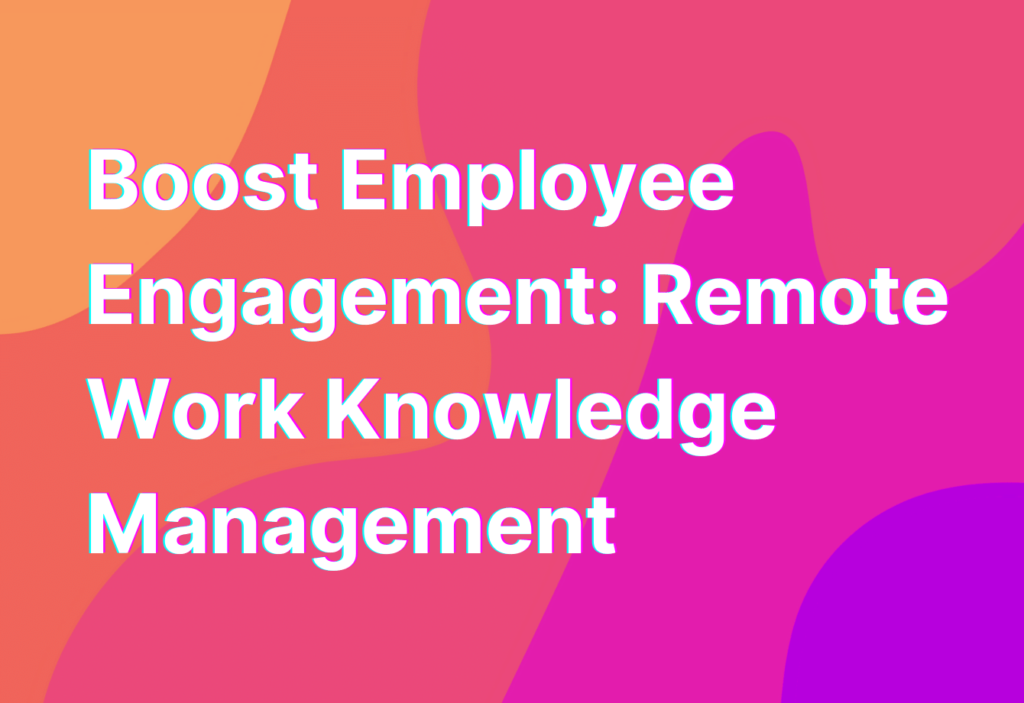Boost Employee Engagement: Remote Work Knowledge Management
Hey there, remote work enthusiasts! It’s Ashley here, your go-to gal for all things remote work. Today, I want to talk about a crucial aspect of remote work that often gets overlooked: knowledge management. Now, I know what you’re thinking, “Ashley, what does knowledge management have to do with employee engagement?” Well, my friend, the answer is everything!
What is Knowledge Management?
Before we dive into the nitty-gritty, let’s start with the basics. Knowledge management is the process of capturing, organizing, and sharing knowledge within an organization. It’s all about making sure that valuable information is easily accessible to everyone who needs it. And in a remote work setting, where teams are scattered across different time zones and locations, effective knowledge management is more important than ever.
Imagine this: you’re working on a project and you come across a roadblock. You know that someone on your team has faced a similar challenge before, but you have no idea who or where to find the solution. Frustrating, right? That’s where knowledge management comes in. With the right systems and tools in place, you can easily tap into the collective wisdom of your team and find the answers you need.
The Benefits of Knowledge Management in Remote Work
Now that we understand what knowledge management is, let’s talk about why it’s so important for remote teams. Here are a few key benefits:
- Improved collaboration: When knowledge is readily available, team members can collaborate more effectively. They can build on each other’s ideas, avoid duplicating work, and find solutions faster.
- Increased productivity: With easy access to knowledge, remote workers can spend less time searching for information and more time getting things done. This leads to increased productivity and better outcomes.
- Enhanced employee engagement: When employees feel supported and empowered with the right knowledge, they are more engaged in their work. They feel valued and motivated to contribute their best.
- Reduced onboarding time: Knowledge management can significantly shorten the onboarding process for new remote employees. They can quickly get up to speed by accessing relevant information and learning from their experienced colleagues.
- Preserved institutional knowledge: Remote work often comes with a higher turnover rate. Knowledge management ensures that valuable knowledge doesn’t walk out the door when employees leave. It preserves institutional knowledge for the benefit of the entire organization.
Tools for Effective Knowledge Management
Now that you’re convinced of the importance of knowledge management, let’s explore some tools that can help you implement it successfully:
- Project management software: Tools like Trello, Asana, and Monday.com are great for organizing and tracking project-related knowledge. You can create boards, assign tasks, and share important documents all in one place.
- Internal wikis: Platforms like Confluence and Notion allow you to create a centralized knowledge base where team members can contribute and access information. It’s like having your own virtual encyclopedia!
- Instant messaging apps: Apps like Slack and Microsoft Teams not only facilitate communication but also serve as repositories of knowledge. You can create channels dedicated to specific topics and easily search for past conversations.
- Video conferencing tools: Tools like Zoom and Google Meet are not just for meetings. They can also be used for knowledge sharing sessions, training sessions, and virtual brainstorming sessions.
- Document collaboration tools: Google Drive and Microsoft Office 365 allow teams to collaborate on documents in real-time. You can leave comments, suggest edits, and track changes, making knowledge sharing a breeze.
These are just a few examples of the many tools available for knowledge management in remote teams. The key is to find the ones that work best for your team’s unique needs and workflows.
Wrapping Up
And there you have it, folks! Knowledge management is the secret sauce to boosting employee engagement in remote teams. By making knowledge easily accessible, you empower your team to collaborate, be more productive, and feel valued. So, don’t underestimate the power of knowledge management in your remote work journey.
If you want to dive deeper into the topic of boosting remote employee engagement, I highly recommend checking out this fantastic article on Open-mindedness. It’s a game-changer, trust me!
Until next time, stay remote and stay awesome!


